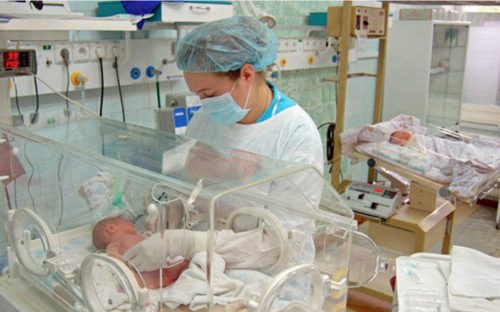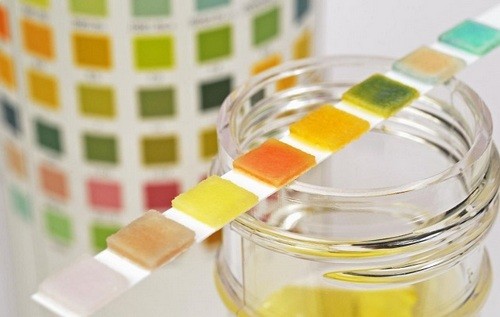Unfortunately, not every birth proceeds without complications. Sometimes there is aspiration of amniotic fluid, so my mother wonders what to do if the child swallows amniotic fluid.
There are many myths about what to expect when a newborn swallows amniotic fluid, as well as what consequences it will lead to. If this happened to your baby, then listen only to doctors and do not ask for advice from friends or on online forums.
Is it dangerous?
If the baby swallowed amniotic fluid at birth, the consequences and possible risk depend on the color of the amniotic fluid.
If clean and clear water gets into the baby’s airways, this can cause inflammation in the bronchi or lungs, but this rarely happens and depends on the individual characteristics and protective functions of the baby’s body.
Ingestion of liquid through the mouth and its penetration into the stomach does not pose a danger to the crumbs, because the entire period of intrauterine development, he was in this environment. European obstetricians are of the opinion that amniotic fluid, when it enters the gastrointestinal tract, does not cause poisoning, since it is not toxic.
But the clinical picture is quite different when the child swallowed green amniotic fluid.

Ingestion of meconium can cause digestive disorders in the baby, which are manifested as follows:
- vomiting
- diarrhea;
- refusal to eat, especially with artificial feeding.
Aspiration of contaminated water and its entry into the airways has even more negative consequences:
- the development of oxygen starvation;
- infectious and inflammatory pathology of the respiratory system;
- threat to the life of the child.
When the amniotic fluid has a high level of contamination, an emergency caesarean section is recommended to avoid negative consequences on the child’s body.
Where do green waters come from?
The appearance of amniotic fluid is directly related to the state of maternal and child organisms. Therefore, a change in the color of the water or its clouding is an alarming signal for medical personnel and is a sign, and if a child swallows green amniotic fluid, urgent action is required.
Darkening of the waters is often found in obstetric practice. You should not immediately start to panic if the doctor told you about it, because the reasons for changing the color of amniotic fluid can be different and do not always pose a serious threat to the condition of the baby. In addition, this phenomenon has not yet been fully studied by the medical scientific community.
The reasons for staining of the amniotic fluid in green are as follows:
- Isolation of meconium. In a third of cases when there is a darkening of the waters, this is due to the fact that the baby, while still in the mother’s womb, empties its intestines, although this usually happens 1-2 days after birth. It is the original feces that gives the green color to the waters.
- Hypoxia. Due to the aging of the placenta during pregnancy, the baby may not have enough oxygen to breathe.
- Infection. If a woman during the expectation of a baby suffered a cold or other infectious disease, this can cause infection of the amniotic fluid.
- Genetic violation. Congenital abnormalities of the fetus often contribute to the staining of water.
- Nutrition. There is a hypothesis that the green food eaten the day before can change the color of the amniotic fluid, however, this statement has no official confirmation.
If the child swallowed amniotic waters during childbirth, this indicates the need for a full examination of the baby and, if necessary, assistance.
Aspiration of amniotic fluid contaminated with original feces occurs in no more than 1-2% of newborns. In general, this is a frequent occurrence in obstetric practice, the mechanisms of occurrence of which are not yet fully understood.
Most susceptible to aspiration syndrome:
- born children;
- born on time, but with pronounced signs of oxygen deficiency;
- babies who have congenital developmental pathologies.
Various conditions can lead to a premature exit of meconium in the fetus, but most often this occurs with asphyxiation and severe stress, which causes increased intestinal motility and emptying.
What if the newborn swallowed amniotic fluid?
How atraumatic and safe the process of the birth of a baby will go is largely dependent on the qualifications of the doctor and the paramedical staff helping to give birth. An experienced doctor will help prevent a child from swallowing amniotic fluid during childbirth, and if this happens, he will take timely measures to remove fluid from the oropharynx, preventing it from entering the stomach or lungs.
When the ingestion of infected amniotic fluid nevertheless occurred, the infant is placed in the intensive care unit, where its condition is monitored around the clock.

If after a couple of days the baby does not show signs of an eating disorder or inflammatory processes of the bronchial tree or lungs, then he will be transferred to the ward to his mother, and after a while both will be discharged home. For preventive purposes, a newborn is given a course of antibiotic therapy to prevent possible infection.
If the child during childbirth swallowed amniotic fluid, then the doctor performs the following actions:
- If meconium clots are present in the water, the nasal cavity and mouth are cleaned of it at the moment when the head was born, and the chest has not yet left the mother’s womb.
- After birth, tracheal intubation is performed and amniotic water that has penetrated the respiratory organs is sucked out.
- The stomach of the newborn is cleaned, which prevents repeated aspiration in case of regurgitation.
- Carrying out oxygen therapy, in difficult situations, mechanical ventilation is indicated.
- The baby is prescribed preventive antibiotics to prevent the development of infection.
It is important for the mother to establish breastfeeding, as breast milk is not only food for the newborn, but also a way to calm down, feel safe, having heard the sound of her own heart. Through breast milk, the baby receives immunoglobulins from her mother, which ensure the immature organism’s resistance to the action of infectious agents.
Rarely, but there are times when doctors may not notice that the baby swallowed the amniotic fluid. Even if the newborn began to breathe independently and made the first cry, this does not mean that you can relax and forget about the aspiration of amniotic fluid.
If a baby swallows amniotic fluid at birth, the consequences may occur after some time. In the first month of life, young parents need to pay attention to any changes in his behavior and well-being.
If the following symptoms are found in the baby, consult a pediatrician in order not to miss the onset of the disease:
- dry cough;
- during inhalation and exhalation unnatural sounds are heard;
- spitting up.
The timely provision of medical care will help to avoid the development of serious complications.
Effects
In a situation when the child swallowed amniotic fluid during childbirth, there is a high probability of consequences. Especially if the amniotic fluid was not sterile due to meconium or infection.
If water is contaminated with meconium, it may develop :
- bronchitis in the first month of an infant’s life;
- inflammatory processes of an infectious nature in the lung tissue;
- digestive disorders;
- weakened immunity in a baby due to the ingress of pathogenic microflora into the sterile intestines of the child.
If the neonatologist immediately after birth correctly diagnosed where the amniotic fluid penetrated and took measures to aspirate the contents from the gastrointestinal tract or respiratory tract, then the consequences will most likely be avoided.
So that the baby does not have to swallow the amniotic waters contaminated with the original feces, the mother needs to carefully monitor herself throughout the pregnancy:
- avoid contact with sick people;
- to prevent ARVI and influenza;
- Do not visit crowded places in order not to become infected with an infectious disease.
When water flows outside the hospital walls, attention should be paid to their shade. If the liquid has a green color, then you should urgently contact the emergency room of the maternity hospital so that the medical staff can provide timely assistance to both the baby and mother.
If amniotic waters have a high degree of infection, an emergency caesarean section is performed. After childbirth, it is important how quickly and correctly the doctor cleans the oropharynx of the baby from amniotic fluid.
When water is swallowed directly in the birth process, in most situations this does not adversely affect the baby’s well-being.
Every expectant mother must remember that her actions can adversely affect not only herself, but also the development of the child. An important role is played by how the birth of crumbs to the light occurs.
If during childbirth a child swallowed amniotic fluid, do not panic. Such an incident does not always have consequences for the baby, but even with aspiration of contaminated fluid, the crumbs have every chance to fully grow and develop, because doctors will make every effort to restore the newborn.




European obstetricians are of the opinion that amniotic fluid, when it enters the gastrointestinal tract, does not cause poisoning, since it is not toxic